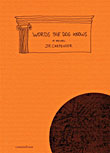Tributaries and Text-fed Streams
a new work of electronic literature by J. R. Carpenter
curated by Kate Armstrong
The Capilano Review, a literary journal based in North Vancouver, has commissioned me to create a new work of electronic literature based on a recent issue dedicated to new writing and new technologies. TCR 2-50 "Artifice & Intelligence," guest-edited by Andrew Klobucar, included essays by: Andrew Klobucar, Global Telelanguage Resources, Sandra Seekins, Kate Armstrong, David Jhave Johnston, Laura U. Marks, Sharla Sava, Kevin Magee, Jim Andrews, Gordon Winiemko, Nancy Patterson and Darren Wershler-Henry.
Tributaries & Text-fed Streams will be a personal, experimental and playful rereading of and response to these essays. I will explore the formal and functional properties of RSS, using blogging, tagging and other Web 2.0 tools to mark-up and interlink essays and to insert additional meta-layers of commentary in order to play with, expose, expand upon, and subvert formal structures of writing, literature, and literary criticism.
Over a four-month period I will read and re-read the essays, parsing them into fragments, which I will then annotate, mark-up, tag and post. Fed into an RSS stream, the fragments will be re-read, reordered, and reblogged in an iterative process of distribution that will open up new readings of the essays and reveal new interrelationships between them. The result of this process-based approach will be a blogchive – part blog, part archive – at once an online repository for the artefacts of re-reading and a stage for the performance of live archiving.
Streams are both literally and metaphorically the central image of the work. Streams of consciousness, data, and rivers flow through the interface and through the texts. Through this process of re-reading and responding, this textual tributary will feed a larger stream while paying tribute to the original source.
Tributaries & Text-fed Streams: A Feed-Reading of The Capilano Review will launch simultaneously on thecapilanoreview.ca (Vancouver) and turbulence.org (New York) in the spring of 2008.
. . . . .
Labels: blog art, Tributaries and Text-Fed Streams, web art, writing








